Research Activities
INS Québec carries out research and innovation activities with a view to improving the performance of high-performance athletes. Working with partners in the academic, medical and private sectors, the Institute’s scientific and medical personnel study, develop and create cutting-edge solutions. These scientific endeavours touch a variety of fields: motor learning, biomechanics, chronobiology, engineering, neuroscience, nutrition, physiology, psychology, etc.
Here are some significant examples or click here for the full list of research projects.
Virtual Reality
VIRTUAL REALITY BOXING SIMULATOR BY DIGITAL VISION
In partnership with the École de technologie supérieure, Thomas Romeas develops a virtual reality boxing simulator as a training tool for elite boxers. Using numerical vision methods, video footage of elite boxers’ movements is transformed into 3D kinematics and embedded within a virtual reality engine to provide an agile and interactive simulator.
Principal investigators
- Hossein Feiz, Ph.D. student, École de technologie supérieure
- David Labbé, professor, École de technologie supérieure
- Sheldon Andrews, professor, École de technologie supérieure
- Jocelyn Faubert, professor, Université de Montréal
- Thomas Romeas, neuroscientist, INS Québec; associate professor, Université de Montréal
Period: 2020–2024
Funding: Mitcas, OTP
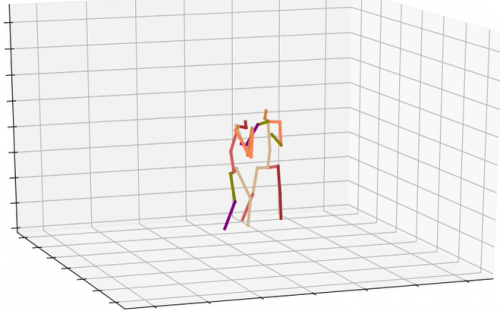
Artificial Intelligence
DIVE ANALYSIS BY DIGITAL VISION
Working with researchers from the École de Technologie Supérieure, INS Québec is developing a tool that uses machine learning to assess the performance of elite divers using video. The video analysis does not require body markers or accelerometers.
[In French] – Radio-Canada | Découverte – Faire parler les images (Radio-Canada, September 27, 2020)
Click here to watch the report
Principal investigators :
- Ramon Figueiredo Pessoa, Ph.D. student, École de Technologie Supérieure
- Carlos Vazquez, professor, École de Technologie Supérieure
- Rachid Aissaoui, professor, École de Technologie Supérieure
- Mathieu Charbonneau, biomechanics specialist, INS Québec
Period: 2018-2021
Funding: OTP, Mitacs
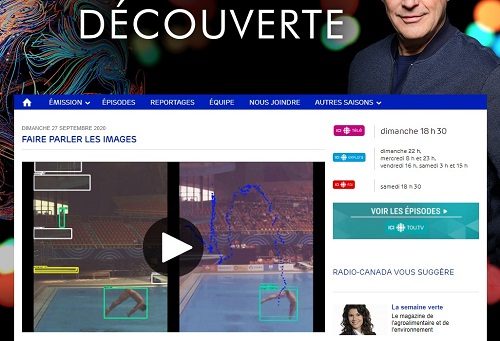
Applications
LONG-HAUL TRAVEL APP
INS Québec is developing a smartphone app that can inform and advise athletes, coaches and other training personnel regarding strategies to reduce the negative effects of trans-meridian travel.
Principal investigators :
- François Bieuzen, exercise physiologist, INS Québec; associate professor, Université Laval
- Phénix Agence Web
- Jeremy Olson, Ph.D. student, McGill University
- Sarah Noël, industrial designer
- Gabriel Legault, undergraduate student, Université Laval
Period: 2017–2019
Funding: MÉES (PRIDI)
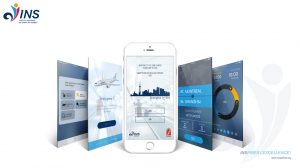
Accelerometry
PROPULSION IN CYCLICAL SPORTS
INS Québec has developed and empirically tested advanced techniques to analyze the accelerometric measurements of the propulsive phases in cyclical sports such as para-swimming. This work has led to a user-friendly feedback tool for coaches.
Publication
Science Direct – Instantaneous velocity estimation for the four swimming strokes using a 3-axis accelerometer: Validation on paralympic athletes
(click to read the article)
Principal investigators:
- Mathieu Charbonneau, biomechanics specialist, INS Québec
- Julien Clément, performance analyst, INS Québec
Period: 2018-2019
Funding: MÉQ (PRIDI)
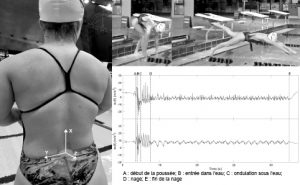
Concussion
PROTECTIVE HELMET FOR SHORT-TRACK SPEED SKATERS
In collaboration with a research team from McGill University, INS Québec is studying the issue of concussions in short-track speed skating, in particular by carrying out an epidemiological analysis of the wounds and conducting impact tests on helmets and measuring the effects of falls on the brain using computer models. The study should lead to the development of a new helmet prototype that meets the specific needs of short-track speed skaters.
Principal investigators :
- Dr. Suzanne Leclerc, Medical Director, INS Québec, clinical associate professor, Université de Montréal
- Thomas Romeas, neuroscientist, INS Québec, associate professor, Université de Montréal
- David Pearsall, professor, McGill University
- Daniel Aponte, Ph.D. student, McGill University
- Matthew Kelly, masters’s student, McGill University
- Taylor Léger, masters’s student, McGill University
Period: 2018-2021
Funding: MÉQ(PRIDI), Mitacs
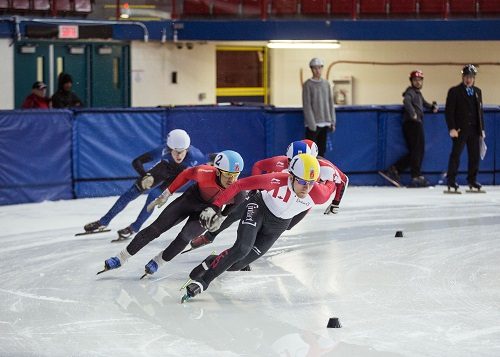
Low energy availability
RED-S
Erik Sesbreno appreciates the prevalence of low energy availability among male volleyball players and its effects on jumper’s knee, cognitive function and countermovement jump performance.
Principal investigator:
- Erik Sesbreno, sport nutrition lead, INS Québec
Period: 2019–2020
Funding: MÉQ (PRIDI)
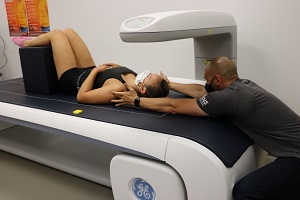
Discover all our research projects
INS Québec has more than 40 research projects to its credit, divided into the following categories:
- Artificial intelligence
- Dissemination of information
- Engineering
- Injury Prevention
- Innovation
- Performance analysis and monitoring
- Performance optimization